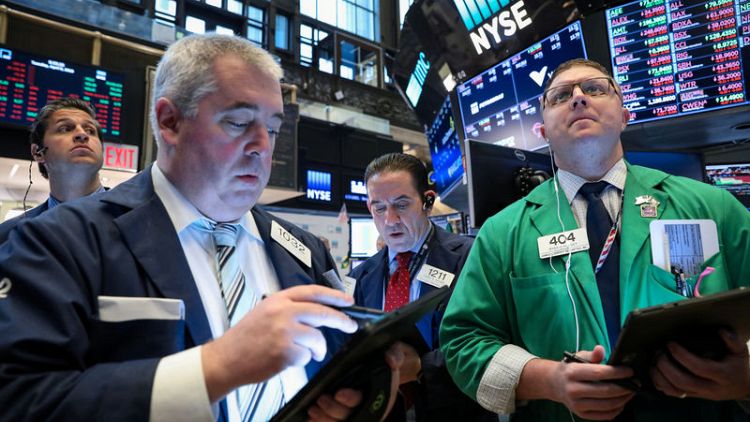By Herbert Lash
NEW YORK (Reuters) - The dollar fell and the rally in global equities lost steam on Tuesday as a U.S. threat to slap tariffs on hundreds of European goods and a downgrade by the International Monetary Fund in its global economic growth forecasts dimmed the appetite for risk.
The IMF warned that growth could slow further due to trade tensions and a potentially disorderly British exit from the European Union. China, Germany and other major economies might need to take short-term actions to support growth, the IMF said.
U.S. Treasury Secretary Steven Mnuchin told lawmakers the Trump administration is preparing for the possibility of a "hard Brexit."
Asian shares rose to an eight-month high overnight but U.S. and European markets fell after President Donald Trump welcomed the World Trade Organization's finding that Europe's subsidies to planemaker Airbus had hurt the United States.
Asian stock markets: https://tmsnrt.rs/2zpUAr4
The U.S. Trade Representative on Monday proposed a range of EU products, from large commercial aircraft and parts to dairy products and wine, to target as retaliation for subsidies given to Airbus.
Equities fell in Europe and on Wall Street, snapping an eight-day rally for the S&P 500, after an EU official said the European trade bloc was beginning preparations to retaliate over Boeing subsidies.
Uncertainty over tariffs and trade between the United States and China have dented business confidence and led corporate investment to dry up, said Hank Smith, co-chief investment officer at The Haverford Trust Co in Radnor, Pennsylvania.
"Business investment is now being put on hold because of the uncertainty around tariffs," he said.
A weak U.S.-China trade deal probably is priced into the market, but a very good trade deal is not, Smith said.
"Even if it's not so good, it is going to have a positive effect on the economy because it is going to remove an uncertainty," he said.
MSCI's all-country world index, a gauge of stock performance in 47 countries, fell 0.35%. The pan-European STOXX 600 index closed down 0.47% and the FTSEurofirst 300 index of leading regional shares fell 0.41%.
Airbus said it saw no legal basis for the U.S. move toward imposing tariffs on its aircraft and warned of deepening trade tensions.
Airbus shares fell 1.86% and many of its key suppliers lost between 0.7% and 1.2%. Boeing shares fell 1.46% ahead of its aircraft delivery and order numbers for March.
On Wall Street, the Dow Jones Industrial Average fell 190.44 points, or 0.72%, to 26,150.58. The S&P 500 lost 17.57 points, or 0.61%, to 2,878.20 and the Nasdaq Composite dropped 44.61 points, or 0.56%, to 7,909.278.
The yen rose as traders favoured the safe-haven currency in the wake of the U.S. proposal for tariffs on European goods.
The dollar index fell 0.04%, with the euro up 0.04% to $1.1263. The Japanese yen strengthened 0.32% versus the greenback at 111.14 per dollar.
U.S. Treasury yields slid, pressured by concerns about the IMF's global economic outlook for 2019 as well as a round of headlines on Britain's messy departure from the EU.
In Europe, government borrowing costs in southern countries hit fresh lows, pushed down by hopes that this week's European Central Bank meeting will reinforce expectations for supportive policy measures in the months ahead.
Portugal's 10-year government bond yield fell to 1.195%, a 25-year low.
Benchmark U.S. 10-year Treasury notes rose 5/32 in price to push yields down to 2.4989%.
Oil fell from a five-month high above $71 a barrel after Russia signalled a possible easing of a supply-cutting deal with the Organization of the Petroleum Exporting Countries.
Brent, the global benchmark, rose to $71.34 a barrel, the highest since November, but later settled down 49 cents at $70.61 per barrel. U.S. crude also hit a November high of $64.79, but settled down 42 cents at $63.98.
Gold rose to its highest in more than a week as the dollar and equities weakened.
U.S. gold futures settled 0.5% higher at $1,308.3 an ounce.
(Reporting by Herbert Lash; Editing by Dan Grebler and Phil Berlowitz)



